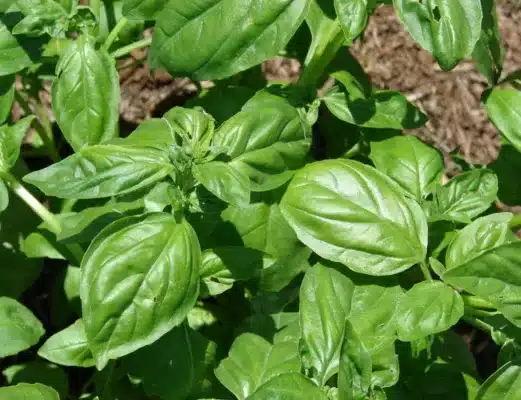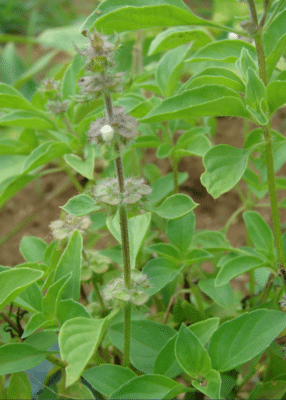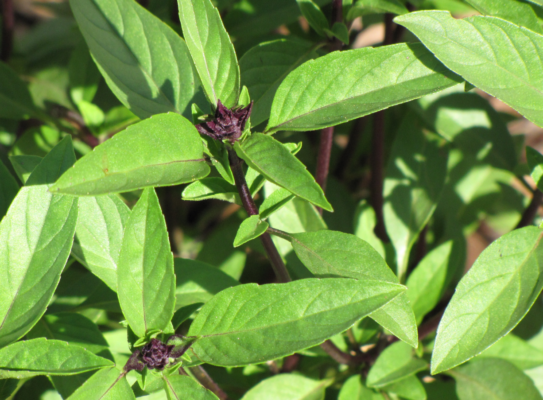Basil Leaves-Nurturing Health: Exploring the Nutritional Riches and Wellness Benefits
Thiruneerpachai or Thunnoothu Pachilai in Tamil. Tulsi in Hindi
Definition & Origin
Definition:
Basil is a fragrant herb belonging to the genus Ocimum, known for its aromatic leaves that are commonly used as a culinary herb in various cuisines around the world. The plant is prized for its distinctive flavor, which is a combination of sweet and savory notes, and it is often used in the preparation of salads, sauces, and a variety of dishes.
Origin:
Tulsi (Ocimum basilicum), a member of the Lamiaceae family, is commonly recognized as Sweet Basil or Tulsi. Originating from India, Asia, and Africa, this low-growing herb has made its mark as a culinary and medicinal treasure. The term “basil” finds its roots in the ancient Greek word “basilican,” translating to “royal,” reflecting the herb’s esteemed reputation.
It is believed to have originated in the regions of tropical Asia and Africa. It has a long history of cultivation and use in different cultures, with its popularity spreading across the Mediterranean, Europe, and eventually reaching other parts of the world. The plant has been cultivated for both culinary and medicinal purposes for centuries.
There are various varieties, each with its unique flavor profile and uses. The most common type is sweet basil (Ocimum basilicum), but others like Thai and holy are also widely used in specific cuisines. It is not only valued for its culinary applications but also for its potential health benefits, as it contains essential oils and compounds that are believed to have antioxidant and anti-inflammatory properties.
Types of Basil
If you want to know about the types found, there are several varieties with distinct flavors and characteristics. Some common types include:
Sweet (Ocimum basilicum): The most common variety used in Italian cuisine and for making pesto.
Thai (Ocimum basilicum var. thyrsiflora): Popular in Southeast Asian dishes, it has a slightly spicy, anise-like flavor.
Lemon (Ocimum basilicum ‘Citriodorum’): Exhibits a citrusy aroma and flavor, often used in salads and seafood dishes.
Holy (Ocimum tenuiflorum): Also known as Tulsi, it’s revered in Hindu culture and used in traditional medicine. It has a peppery, clove-like taste.
Cinnamon (Ocimum basilicum ‘Cinnamon’): Offers a sweet and spicy flavor reminiscent of cinnamon, commonly used in desserts.
Purple (Ocimum basilicum ‘Purpurascens’): Known for its dark purple leaves, it has a similar flavor to sweet.
These are just a few examples, and there are many more basil varieties, each with its own unique characteristics, flavors, and uses.
Nutrients
Basil, the flavorful herb, brings a wealth of essential nutrients to the your table.
Total Fat: Plays a role in supporting diverse bodily functions.
Sodium: Governs fluid balance and nerve functionality.
Potassium: Vital for heart health and maintaining fluid equilibrium.
Total Carbohydrate: Serves as a primary energy source.
Dietary Fiber: Nurtures digestive well-being.
Granulated Sugar: Present in minimal amounts, contributing to flavor.
Protein: Crucial for the construction and restoration of tissues.
Vitamins and Minerals:
Vitamin C: Elevates the immune system and enhances skin health.
Calcium: Critical for the strength of bones and teeth.
Iron: Essential for the transport of oxygen in the bloodstream.
Vitamin D: Facilitates calcium absorption, albeit in modest quantities.
Vitamin B6: Supports the development and function of the brain.
Cobalamin: A B-vitamin pivotal for metabolism.
Magnesium: Contributes to the function of muscles and nerves.
Collectively, these nutrients underscore basil’s value as a significant and healthful component of a balanced diet.
Basil, beyond its culinary appeal, offers a range of health benefits:
Anti-Inflammatory Properties: It contains essential oils like eugenol, which exhibit anti-inflammatory effects, potentially reducing inflammation in the body.
Rich in Antioxidants: The presence of antioxidants, such as flavonoids and polyphenols, helps combat oxidative stress, protecting cells from damage caused by free radicals.
Supports Heart Health: Potassium in Tulsi helps regulate blood pressure, contributing to cardiovascular health. The herb’s compounds may also aid in lowering cholesterol levels.
Boosts Immune System: Basil is a good source of vitamin C, known for its immune-boosting properties, helping the body defend against infections and illnesses.
Enhances Digestive Health: The dietary fiber in basil promotes healthy digestion, preventing constipation and supporting gut health.
Anti-Bacterial Properties: It contains compounds like linalool and estragole, which exhibit antimicrobial properties, potentially helping to combat harmful bacteria.
Stress Reduction: Some compounds in plants, such as adaptogens, may have stress-relieving properties, contributing to overall mental well-being.
Joint Health: The anti-inflammatory properties of Tulsi may benefit individuals with inflammatory joint conditions, providing relief from discomfort.
Rich in Nutrients: It is a good source of essential nutrients, including vitamins A, K, and minerals like iron and calcium, contributing to overall nutritional well-being.
Potential Anti-Cancer Properties: Some studies suggest that it may contain compounds with anti-cancer properties, though more research is needed in this area.
Incorporating basil into your diet can be a flavorful way to enjoy these health benefits while adding a nutritional boost to your meals.



